Namecheap vs Chemicloud: Final verdict
Looking over Namecheap vs. ChemiCloud, it’s clear why both hosts are so popular. They have both hosted millions of
websites that run on WordPress for decades, building up a loyal customer base.
ChemiCloud (Overall grade: 8.5)
emerges as the stronger contender with its superior server performance, thanks to NVMe storage, LiteSpeed web server, and HTTP/3 support. With a Laravel/Django application ready to deploy directly out of the box, daily backups, and strong DDoS protection, it ensures minimal downtime and strong security. The added benefit of 45-day money-back guarantee along with excellent customer service makes ChemiCloud an excellent choice for high-traffic websites, small businesses with growing needs, and agencies requiring reseller plans.
Namecheap (Overall grade: 7.2)
excels in affordability and ease of use, featuring an intuitive cPanel and the EasyWP dashboard for WordPress users. Its strong suite of features includes multiple types of SSL certificates, a free CDN, and an impressive uptime guarantee. Yet, occasional fluctuations in uptime and response times keep it behind ChemiCloud in performance. Despite this, Namecheap’s cost-effective pricing, comprehensive support options, and strong security features make it an attractive option, especially for beginners, small businesses with tight budgets, and established businesses in need of dedicated servers.
 Overall grade:7.2 |
 Overall grade:8.5 |
|
|---|---|---|
| Uptime and Availability | 8.0 | 9.3 |
| Hosting Performance | 8.2 | 8.9 |
| Hosting Security | 8.5 | 8.8 |
| Price | 8.7 | 8.3 |
| Hosting Features | 7.5 | 7.5 |
| Ease Of Setup | 8.8 | 8.8 |
| User Management | 0.0 | 8.0 |
| Customer Support | 8.0 | 8.3 |
| User feedback | 4.3/5 | 4.9/5 |
Hosting types offered
Both platforms provide a variety of hosting types, each designed to meet the different needs of users.
 |
 |
|
|---|---|---|
| Shared hosting | ||
| Cloud hosting | ||
| WordPress hosting | ||
| Ecommerce hosting | ||
| VPS hosting | ||
| Dedicated hosting |
Although both offer a variety of hosting plans tailored to different needs, in
certain cases, one platform may prove to be more suitable.
3x faster speeds than traditional shared hosting.
features make it better for businesses prioritizing long-term growth and stability.
WHMCS, and free migrations, making them suitable for managing multiple sites.
and easy scaling options.
and streaming capabilities are more suitable.
Detailed comparison
Uptime and availability
Evaluates the average uptime statistics, uptime guarantee and overall availability of the hosting
provider
Score Components:
- Uptime percentage (30%): evaluates the uptime statistics in given period of time
- Uptime guarantee (20%): Assesses if the platform offers an uptime guarantee and
whether the actual uptime matches the promised guarantee. - General performance (25%): Evaluates how fast is the average response time and overall
it’s stability. - Responsiveness (10%): Adaptability to different devices and screen sizes.
- Availability (25%): Reflects the total downtime and number of outages.
 8.0
8.0
 9.3
9.3
Winner ChemiCloud: ChemiCloud provides superior uptime and availability guarantees backed by robust infrastructure and proactive monitoring.
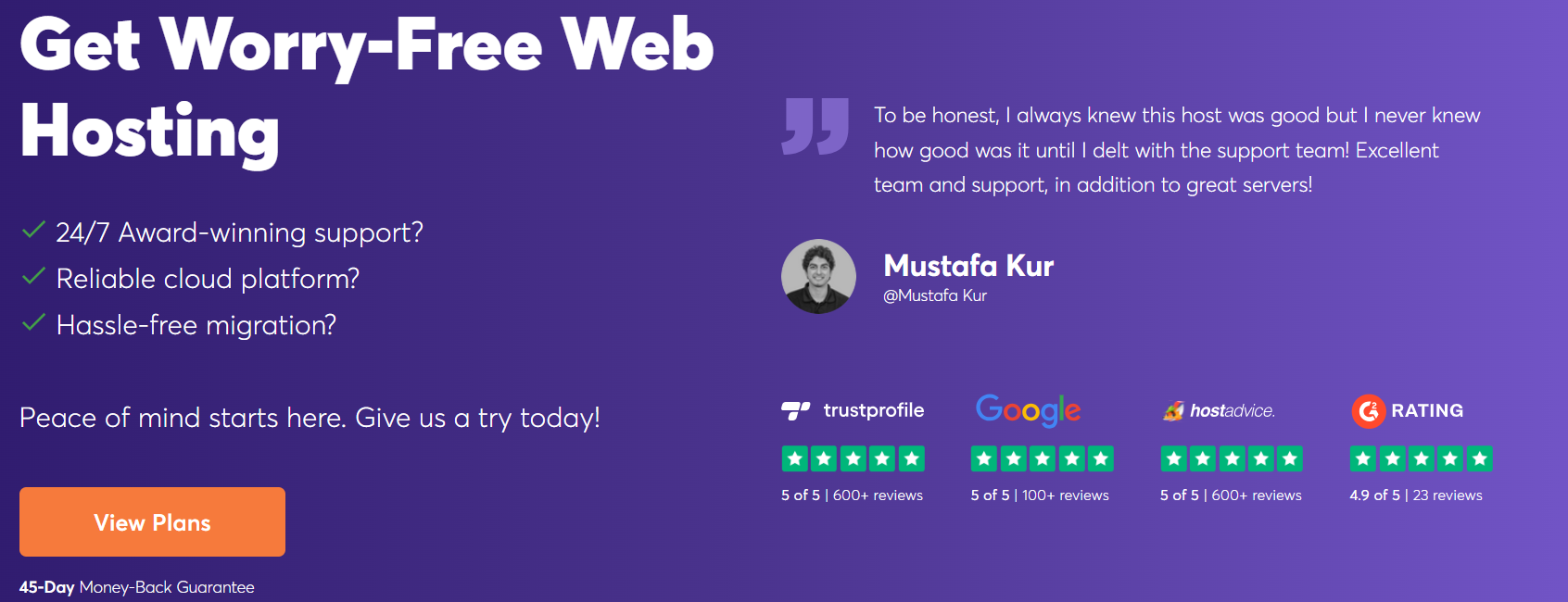
Namecheap enforces a solid uptime policy, delivering 100% for shared, business, and dedicated servers, and 99.9% for reseller and VPS accounts. Its EasyWP managed WordPress hosting also promises 99.9% uptime. Recent tests show legitimate uptime, hitting up to 99.96% across various periods. Response times, while adequate, lag behind some competitors, with notable regional differences in load times.

ChemiCloud outperforms with a steadfast 99.99% uptime guarantee, supplemented by compensation if uptime drops below this threshold. Its robust cloud infrastructure, 24/7 monitoring, and real-time DDoS protection ensure swift issue resolution. With server locations across the globe, ChemiCloud maximizes accessibility, reinforced by a commitment to customer support and comprehensive service monitoring.
Which one has better hosting performance?
Score Components:
- Hosting speed (30%): This includes SSD quality, Load times, PageSpeed score ranges,
additional information on website speed, built-in plugins for performance enhancement, available caching
methods, and CPU/RAM options - CDN (20%): Considers whether CDN is available or not, whether it’s free or paid, and
the quality of the CDN service - Available data centers (30%): Evaluates the number of data centers and their locations
globally. - Scalibility (20%): Looks at whether elastic scaling is available, the process required
to scale (manual upgrade vs. automatic scaling), the presence of dedicated servers, and the costs
associated with scaling.
 8.2
8.2
 8.9
8.9
🏆 Winner ChemiCloud: Fast, secure, and reliable hosting service with cutting-edge technology.
When comparing the general performance, ChemiCloud stands out with its use of NVMe storage, LiteSpeed web server, and HTTP/3 Protocol, ensuring excellent load times and website speed. Namecheap, while reliable, uses SSD storage and offers strong uptime guarantees. Both providers include free CDN services, but ChemiCloud’s integration with Cloudflare adds an extra edge in terms of speed and reliability. ChemiCloud’s worldwide server locations also outnumber Namecheap’s, providing more options for low-latency data centers.
Website Speed
ChemiCloud sets itself apart by offering LiteSpeed web server, NVMe storage, and additional caching technologies like Redis and OPcache. Namecheap’s WordPress hosting (EasyWP) is also commendable, boasting a fully loaded time of 0.7 seconds and 3x faster speed than traditional hosting. Both providers offer free SSL certificates, but ChemiCloud’s technological stack ensures a slight edge in delivering faster webpage loads consistently.
Scalability
Scalability is another critical factor to consider. ChemiCloud does not specify if it offers elastic scaling; however, it does provide a hassle-free migration service, which could imply ease of upgrading between plans. Namecheap offers a wide range of plan options, from shared to VPS hosting, but requires manual upgrades when scaling is needed. The cost of scaling with either provider is not explicitly clear, although Namecheap offers more detailed options for increasing resources like CPU and RAM.
Which one has better security features?
and regulatory requirements
Score Components:
- Technical security measures (40%): This includes encryption, firewalls, DDoS
protection, secure configurations, server monitoring, access control and availability of security addons
(e.g Sitelock security). - Operational security measures (30%): Encompasses data privacy, backups and data
redundancy. - Compliance and certifications (20%): Adherence to legal and regulatory requirements
(e.g., GDPR, HIPAA) and possession of certifications (e.g., ISO 27001, SOC 2). - Business and reliability (10%): Factors in the provider’s reputation, uptime
guarantees, and customer support.
 8.5
8.5
 8.8
8.8
🏆 Winner
ChemiCloud: Boasts robust security measures and comprehensive compliance to ensure site protection and reliability.
Both Namecheap and ChemiCloud, have notable differences in their approaches to technical and operational security, as well as in their compliance with regulations.
Technical security measures:
Namecheap offers a variety of SSL certificates including DV, OV, and EV, suitable for different levels of user needs. They support PHP 5.X to PHP 8.X, ensuring compatibility with older and newer applications. Namecheap also provides two-factor authentication (2FA), domain privacy, and a host of other features like virus scanners and IP deny managers. On the other hand, ChemiCloud provides free Let’s Encrypt SSL certificates and supports multiple PHP versions from 5.6 to 8.2. ChemiCloud also uses Imunify360 for proactive defense, an advanced firewall, real-time network protection, DDoS protection, and CloudLinux OS for server stability and account isolation.
Operational security measures:
Both Namecheap and ChemiCloud offer extensive operational security measures. Namecheap includes features like FastVPN, Jellyfish Spam Protection, BoxTrapper, and CodeGuard Backup. ChemiCloud takes a slightly more advanced approach with features like a rebootless secure kernel powered by KernelCare, proactive server monitoring, and 24/7 network monitoring. ChemiCloud also offers daily backups, robust email protection and spam filtering, while Namecheap focuses on providing additional security layers through its comprehensive suite of security features.
Compliance and certifications:
Both Namecheap and ChemiCloud are GDPR compliant. Namecheap provides GDPR rights like the right of access, rectification, and the right to be forgotten. ChemiCloud not only meets GDPR requirements but also offers a Data Processing Addendum (DPA) for organizations needing it. However, neither provided specific information regarding HIPAA or PCI compliance.
 |
 |
|
|---|---|---|
SSL certificate |
DV, OV, EV, Wildcard, Multi-domain |
Free Let’s Encrypt SSL |
Additional security features |
FastVPN, BoxTrapper, CodeGuard |
Imunify360, CloudLinux OS |
PHP versions |
5.X to 8.X |
5.6 to 8.2 |
GDPR compliance |
Yes |
Yes |
HIPAA compliance |
Not specified |
Not specified |
PCI compliance |
Not specified |
Not specified |
Hosting features
Score Components:
- Domains (20%): Assesses the availability of a free domain, domain purchase options, and
pricing - Email (15%): Considers if the provider offers full email hosting, or is reselling
third-party service, and if the email is only transactional or not - Website builder (15%): Checks if website builder is available, and it’s user
friendliness and overall the level of customization allowed. - Staging environment (20%): Determines if a staging environment is available, allowing
for testing changes before going live. - FTP & SFTP accounts (10%): Evaluates if and how easily users can access FTP and
SFTP accounts - Git and SSH access (20%): Assess whether Git is integrated into the hosting service and
if SSH access is provided
 7.5
7.5
 7.5
7.5
🏆 Winner ChemiCloud: Providing robust hosting options and a comprehensive set of features.
Both Namecheap and ChemiCloud offer a variety of hosting services that cater to different user needs. Namecheap provides Shared Hosting, Reseller Hosting, and WordPress Hosting plans with a focus on affordability and simplicity. Their plans include a website builder, making it user-friendly for beginners. One of Namecheap’s unique selling points is the provision of 50 free PositiveSSL certificates for one year and free website migration within 24 hours, which can appeal to users looking for cost-effective security options. Their data centers located in the US, UK, and EU enhance the reliability of their services globally.
ChemiCloud, on the other hand, appeals to users seeking higher performance with features such as NVMe storage. They offer similar hosting options, including Drupal and Shared Hosting. The noteworthy inclusion of pro and turbo features like HTTP/3 support and advanced caching mechanisms can significantly benefit websites expecting high traffic volumes. The provision of SSH and SFTP access caters to more technical users, ensuring greater control over their hosting environment. Their free domain offering and hassle-free website migrations are attractive to those prioritizing ease of setup and ongoing support.
 |
 |
|
|---|---|---|
Free domain |
No |
Yes |
Free SSL |
Yes, for the first year |
Yes |
Email hosting |
Yes |
Yes |
Website builder |
Yes |
No |
Staging environment |
No |
Yes |
FTP & SFTP accounts |
Yes |
Yes |
Git and SSH access |
Yes |
Yes |
Free backup |
Yes |
Yes |
Money-back guarantee |
Yes |
Yes |
a location.
As a result in rare cases the features mentioned here can differ from the ones you see on their websites.
Both providers support a range of users from beginners to experts with user-friendly website builders and WordPress staging areas. However, in terms of developer tools, both Namecheap and ChemiCloud offer robust options including SSH access, support for multiple programming languages, and Git for version control, thus appealing to developers looking for advanced capabilities.
Email services:
Namecheap offers a comprehensive set of email features, including domain-based email addresses, unlimited email forwarders, and Jellyfish Spam Protection. Their plans also include a customizable spam filter through SpamAssassin. ChemiCloud provides essential email functionalities like email forwarders, autoresponders, and spam filters, with 2 GB of mailbox storage per email account. Both hosting providers support email hosting and transactional email capabilities, yet Namecheap’s integration of additional spam protection tools may offer an edge for users concerned about email security.
Price
Score Components:
- Plan value (40%): What each pricing tier offers.
- Transparency and clarity (30%): Clearness of pricing structures.
- Flexibility of plans (20%): Range of options to suit different budgets.
- Hidden costs (10%): Additional expenses not included in the plan.
 8.7
8.7
 8.3
8.3
🏆 Winner
Namecheap: Namecheap scores slightly higher overall, mainly due to the robust features included in their plans and the transparency of what’s included.
Evaluating the pricing of plans among various hosting providers can be complex due to their differing pricing and renewal strategies. Additionally, certain plans require annual commitments, which adds to the difficulty of making comparisons. The prices listed are based on monthly commitments; plans requiring annual commitments are indicated. Additionally, although some providers offer identical plans for WordPress and shared hosting, we have created separate tables for each to enhance clarity.
Comparing the pricing plans of Namecheap and ChemiCloud, Namecheap offers lower starting prices and comprehensive features like free domain names and SSL certificates across all plans. ChemiCloud, although slightly more expensive, bundles unique features such as free malware scanning and higher NVMe storage in specific plans. Namecheap stands out with its managed WordPress plans that promise faster installation and better uptime. Both providers include free website migrations and a money-back guarantee, making them competitive choices.
 |
 |
|---|---|
|
EasyWP Starter $6.88
1 WP website, 10 GB SSD storage, 50k visitors/month, Free CDN, Free SSL, Easy backups and restores. Value for price:9.0
|
WordPress Starter $9.95
1 WP website, 20 GB NVMe Storage, Unlimited Bandwidth, Free Domain, One-Click WP installs, 10 Days Backups, Free SSL. Value for price:8.0
|
|
EasyWP Turbo $12.88
1 WP website, 50 GB SSD storage, 200k visitors/month, Free CDN, Free SSL, 1.5x more CPU and RAM. Value for price:9.0
|
WordPress Pro $15.95
Unlimited WP websites, 30 GB NVMe Storage, Unlimited Bandwidth, Free Domain, One-Click WP installs, 20 Days Backups, Free SSL, 2x More CPU & RAM. Value for price:8.5
|
|
EasyWP Supersonic $19.88
1 WP website, 100 GB SSD storage, 500k visitors/month, Free CDN, Free SSL, 2x more CPU and RAM. Value for price:9.0
|
WordPress Turbo $19.95
Unlimited WP websites, 40 GB NVMe Storage, Unlimited Bandwidth, Free Malware Scanner & Removal, 30 Days Backups, 3x More CPU & RAM. Value for price:8.7
|
 |
 |
|---|---|
|
Stellar $4.48
3 Websites, 20 GB SSD, 30 Mailboxes, Free domain & SSL, Free website migration. Value for price:8.5
|
Starter $9.95
1 Website, 20 GB NVMe Storage, Unlimited Bandwidth, Free Domain, Free Migration, 10 Days Backups, Free SSL. Value for price:8.0
|
|
Stellar Plus $6.48
Unlimited Websites, Unmetered SSD, Unlimited Mailboxes, Free domain & SSL, AutoBackup. Value for price:8.7
|
Pro $15.95
Unlimited Websites, 30 GB NVMe Storage, Unlimited Bandwidth, Free Domain, Free Migration, 20 Days Backups, Free SSL, 2x More CPU & RAM. Value for price:8.5
|
|
Stellar Business $9.48
Unlimited Websites, 50 GB SSD, Unlimited Mailboxes, Free domain & SSL, AutoBackup & Cloud Storage. Value for price:8.9
|
Turbo $19.95
Unlimited Websites, 40 GB NVMe Storage, Unlimited Bandwidth, Free Malware Scanner & Removal, 30 Days Backups, 3x More CPU & RAM. Value for price:8.7
|
 |
 |
|---|---|
| N/A |
Cloud 1 $54.95
Unlimited Websites, 80 GB NVMe Storage, 4 TB Bandwidth, 4 GB Memory, 2 x 2.20GHz CPU, Free cPanel/WHM, SSL, Private Nameservers. Value for price:8.0
|
| N/A |
Cloud 2 $87.95
Unlimited Websites, 160 GB NVMe Storage, 5 TB Bandwidth, 8 GB Memory, 4 x 2.20GHz CPU, Free cPanel/WHM, SSL, Private Nameservers. Value for price:8.3
|
| N/A |
Cloud 3 $153.95
Unlimited Websites, 320 GB NVMe Storage, 6 TB Bandwidth, 16 GB Memory, 6 x 2.20GHz CPU, Free cPanel/WHM, SSL, Private Nameservers. Value for price:8.6
|
Enterprise plans
Namecheap’s Advanced Dedicated Server offers customizable configurations suitable for high-traffic websites, content streaming, and machine learning applications, starting from competitive pricing. ChemiCloud’s Cloud 3 plan features robust NVMe storage, impressive bandwidth, and extensive management options. Both vendors provide exceptional support and features tailored for enterprise needs, but ChemiCloud’s cloud infrastructure promotes scalability, making it a viable choice for extensive business operations.
Namecheap vs Chemicloud: Ease of setup
platform.
Score Components:
- Site migration (25%): Assesses whether the provider offers tools for site migration,
either automated or manual, and whether these services are free or require a fee. - Admin panel usability (35%): Evaluates the type of admin panel provided, such as the
standard cPanel or a custom solution, focusing on its accessibility and user-friendliness for both
technical and non-technical users. - Setup features (20%): Examines the availability and ease of use of various setup
features, including FTP accounts, file managers, email account setup, PHPMyAdmin, and easy CDN
configuration. - Help center quality (20%): Measures the quality and accessibility of the provider’s
help center resources, including articles and tutorials.
 8.8
8.8
 8.8
8.8
🏆 Winner: Namecheap: A user-friendly solution with easy setup and comprehensive support.
Namecheap employs both cPanel and a customized EasyWP dashboard. The cPanel is included in most of their hosting plans and provides a familiar environment for those experienced with web hosting. EasyWP, on the other hand, offers a streamlined, user-friendly interface specifically designed for managing WordPress sites, making it accessible for non-technical users. The dashboard simplifies common tasks like connecting domains and managing backups. The inclusion of Softaculous for one-click installations further enhances the ease of setup, allowing both technical and non-technical users to get started quickly.
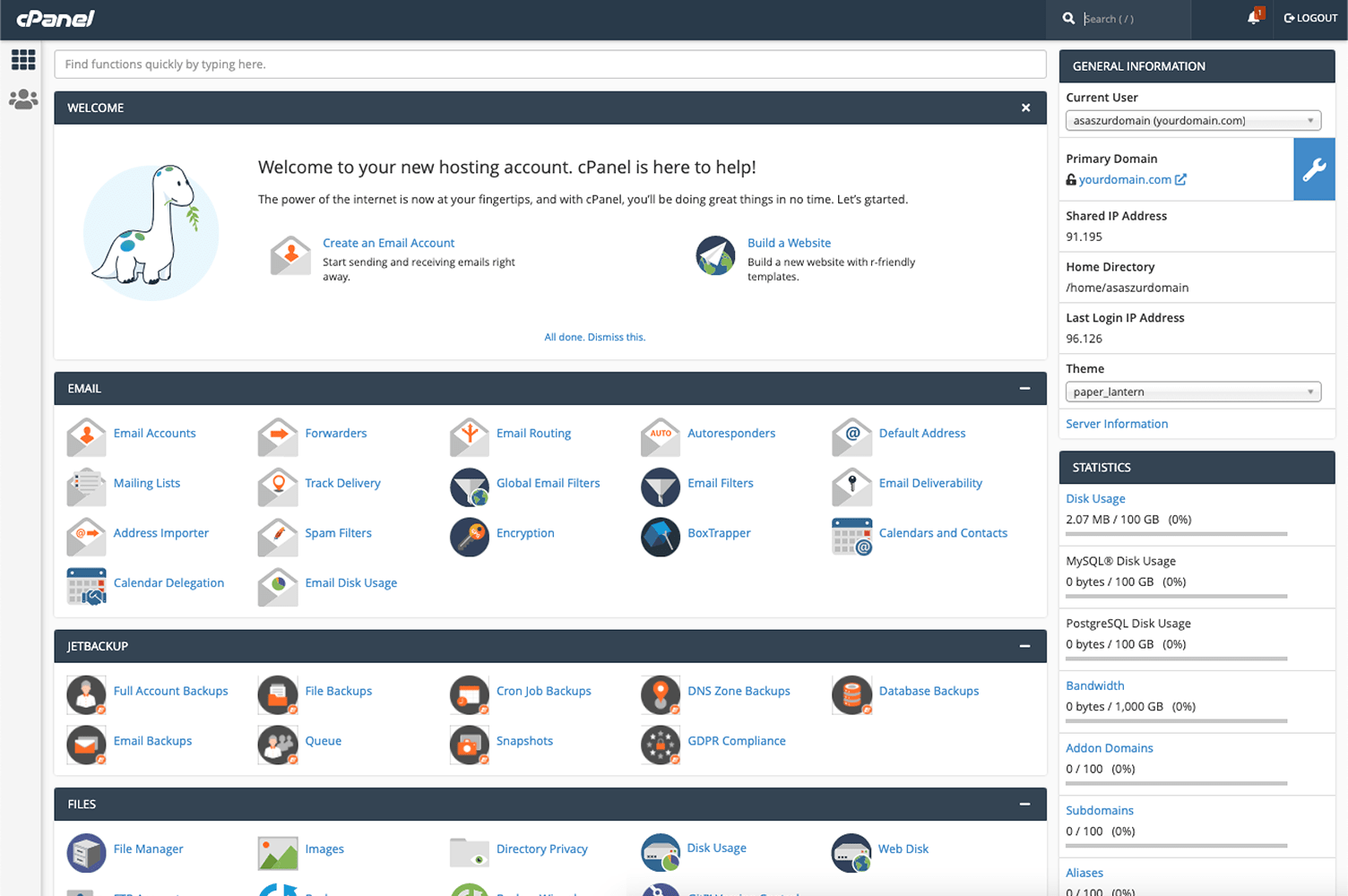
ChemiCloud offers a standard cPanel along with a user-friendly client area. The client area includes cPanel quick-launch, disk usage stats, and email account creation—all integrated into a single dashboard. The user experience is further simplified by an interactive quick start tour that helps users understand the functionalities of the client area. Additionally, the drag-and-drop website builder makes it easy for non-technical users to create professional-looking websites without coding. Consequently, both hosting providers offer accessible and user-friendly admin panels, but Namecheap’s customized EasyWP dashboard adds an extra layer of simplicity for WordPress users.
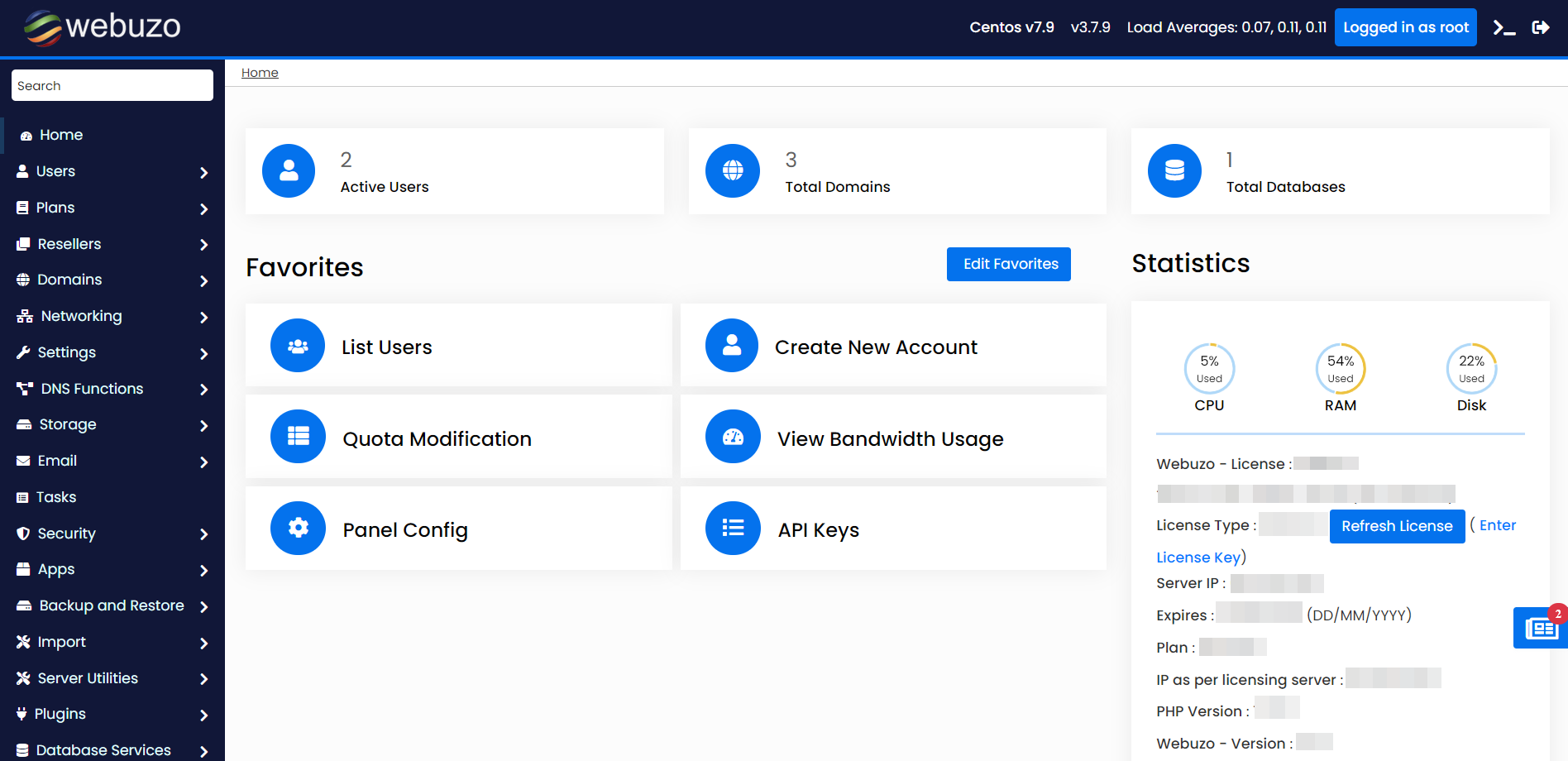
Namecheap provides free migration services, regardless of the web host from which the site is being migrated. This service is performed using the All-in-One WP Migration plugin, ensuring a smooth and hassle-free transfer. ChemiCloud also offers free website migration, promising a seamless transition with no downtime. Both providers make the migration process straightforward and user-friendly, eliminating the need for users to have technical expertise in this area.
Namecheap’s help center consists of a comprehensive Knowledgebase, a 24/7 live chat, and a ticket system protected by SSL encryption. The Knowledgebase includes setup guides, troubleshooting tips, and FAQs, making it easy for users to find the information they need. ChemiCloud also offers an extensive Knowledge Base & Self-Support Center that includes detailed sections on getting started, domains, hosting management, and more. Their 24/7 support is enhanced by instant live chat and a quick response time for tickets. Both providers offer extensive and accessible help center resources, ensuring that users can easily find the support they need.
User management
accessibility.
Score Components:
- Role customization (40%): Flexibility in creating and defining user roles and
permissions. - Ease of management (30%): User interface and tools for managing users.
- Access control (20%): Effectiveness of access control measures for different user
levels. - Scalability (10%): Ability to manage a growing number of users efficiently.
 0.0
0.0
 8.0
8.0
🏆 Winner
ChemiCloud: A user-friendly hosting provider with comprehensive user management features.
When comparing Namecheap and ChemiCloud in terms of managing user roles, permissions, and accessibility, ChemiCloud stands out due to its well-structured approach provided through cPanel’s User Manager and Team Manager functionalities. While Namecheap lacks detailed documentation on user management capabilities, ChemiCloud offers the ability to create subaccounts and assign specific roles such as Administrator, Database, Email, and Web. This yields a high degree of flexibility in defining user permissions and roles, making it easier for administrators to control access and delegate tasks effectively.
ChemiCloud’s user management interface is intuitive, with a straightforward cPanel User Manager. Adding, editing, and deleting users is a smooth process involving a few clicks and basic information entry. The presence of the Password Generator enhances security, and users can be assigned specific services such as Email and FTP based on their roles. The interface supports managing users for multiple domains, simplifying the task for administrators handling various projects.
Regarding access control measures, ChemiCloud is effective in catering to a growing user base. The platform allows for easy modifications of roles and permissions through the cPanel interface, ensuring that administrators can adapt to changing organizational needs. Each user role comes with predefined access levels, which can streamline the process of managing users without overwhelming the system’s security. Deleting users is also a straightforward process, confirming ChemiCloud’s efficiency in user management.
ChemiCloud user roles table:
| Role | Description | Access highlights |
|---|---|---|
| Administrator | Complete control over the cPanel account. | Full permissions including managing other users and configuring the cPanel environment. |
| Database | Access to database management tools. | Permissions to create, edit, and manage databases. |
| Access to email administration tools. | Permissions to manage email accounts and settings. | |
| Web | Access to website functionality tools. | Permissions related to website management, page edits, and uploads. |
Customer support
hosting provider.
Score Components:
- Support communication channels (30%): Measures the variety of customer support types
provided (live chat, chatbot, email, phone, etc.) - Availability (20%): Assesses the availability hours for each channel, including 24/7
support options. - Technical support quality (30%): Assesses whether the provider offers comprehensive
technical support, including hardware upgrades (e.g., HDD to SSD), software installations, and web
server configuration changes. - Enterprise support (20%): Checks if there are dedicated or priority support services
for enterprise-level customers.
 8.0
8.0
 8.3
8.3
🏆 Winner
ChemiCloud: ChemiCloud stands out for its rapid response times and a slightly higher customer satisfaction rating.
 |
 |
|
|---|---|---|
Phone support |
||
Live chat support |
||
Chatbot |
||
Email/ticket support |
||
Enterprise support (dedicated agent, priority support) |
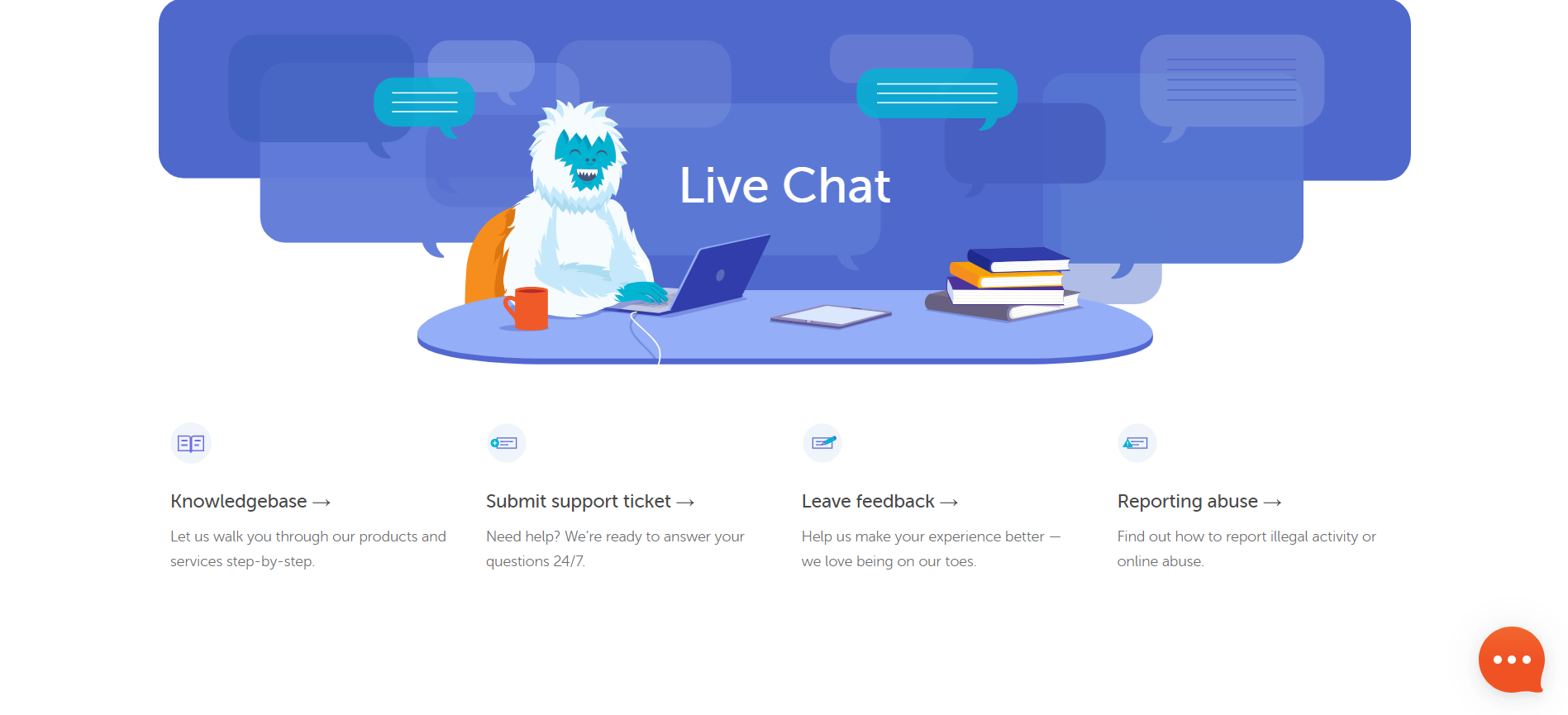
Namecheap and ChemiCloud both offer extensive customer support options but differ in some key areas. Namecheap excels with multiple 24/7 support channels, including live chat, a ticketing system, and an expansive knowledge base featuring a variety of resources such as Guru Guides and How-To Videos. Namecheap’s customer support is generally praised for being friendly and helpful. One limitation is the absence of phone support, which may be inconvenient for some users.
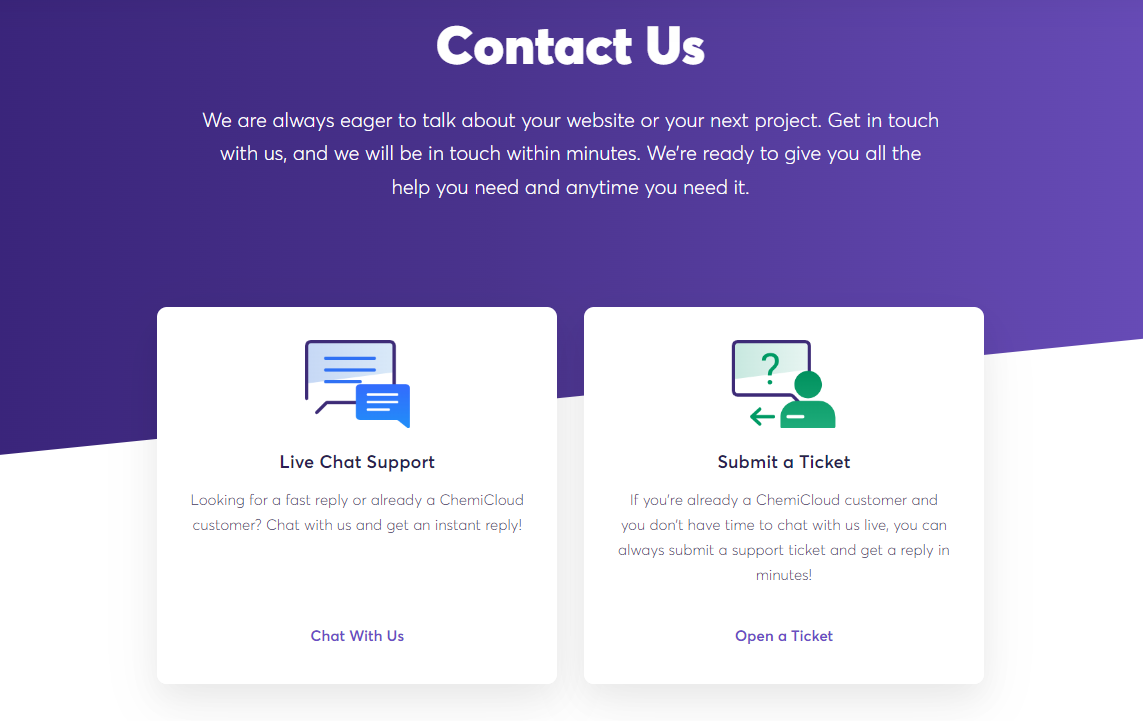
ChemiCloud, on the other hand, complements 24/7 customer support with phone support and boasts fast response times—approximately 10 seconds for live chat and 35 minutes for ticket resolution. They have a higher customer satisfaction rating of 98% and offer additional perks like a 45-day money-back guarantee and proactive server monitoring. Free migration and SSL are also included, making it a strong choice for comprehensive support and reliability.
Namecheap vs Chemicloud: User feedback
Namecheap is widely appreciated for its affordability, reliability, and high-quality customer support. Users commend the availability of free SSL certificates, user-friendly cPanel, and outstanding hosting speed. However, shared hosting speed and the occasional slow response from support are noted concerns. Despite these minor drawbacks, Namecheap remains a popular choice for beginners and small to medium businesses due to its competitive pricing and satisfactory service quality.
ChemiCloud receives overwhelmingly positive reviews from its users, who particularly praise its exceptional customer service, technical support, and reliability. Users highlight the fast server performance, user-friendly cPanel, and comprehensive 24/7 support as significant advantages. The majority of reviewers note that they have experienced no downsides or issues, with a couple of minor mentions about limited customizations and data center locations. Overall, customers are highly satisfied and often recommend ChemiCloud as a leading hosting provider.
Namecheap vs Chemicloud: FAQ
Which platform is better suited for hosting WordPress websites?
Namecheap and ChemiCloud both offer robust options for hosting WordPress websites. Namecheap provides EasyWP plans that deliver 3x faster speeds than traditional shared hosting. ChemiCloud also offers one-click WordPress installations and comes with NVMe storage and advanced caching mechanisms, which ensure faster load times. Overall, both platforms are well-suited, but the choice may depend on specific performance and budget preferences.
Are both platforms suitable for beginners?
Yes, both Namecheap and ChemiCloud are suitable for beginners. Namecheap features an intuitive cPanel interface and the EasyWP dashboard specifically designed for WordPress users, making it easy to manage websites. ChemiCloud also offers a user-friendly client area and an interactive quick start tour to help new users navigate their hosting environment. Both platforms provide extensive support and easy-to-use tools to facilitate website management for beginners.
Which hosting service offers better security features?
ChemiCloud offers more advanced security features compared to Namecheap. ChemiCloud provides Imunify360 for proactive defense, an advanced firewall, real-time network protection, DDoS protection, and CloudLinux OS for server stability and account isolation. While Namecheap also offers robust security measures including two-factor authentication (2FA), domain privacy, and a variety of SSL certificates, ChemiCloud’s comprehensive approach to security gives it an edge.
What are the major differences in pricing and value between namecheap and chemicloud?
Namecheap generally offers lower starting prices and includes features like free domain names and SSL certificates across all plans. In contrast, ChemiCloud is slightly more expensive but includes unique features such as free malware scanning and higher NVMe storage in specific plans. Namecheap stands out for its affordability and comprehensive features, while ChemiCloud offers better performance and advanced functionalities at a higher price point.
Which platform offers better customer support?
ChemiCloud offers slightly better customer support compared to Namecheap, with fast response times averaging about 10 seconds for live chat and 35 minutes for ticket resolution. ChemiCloud also provides phone support and boasts a customer satisfaction rating of 98%. Namecheap, although praised for its friendly and helpful support through live chat and a ticket system, does not offer phone support. Both platforms provide extensive knowledge bases and 24/7 support.
The making of this blog
We followed a clear, step-by-step process to write and research this article.








